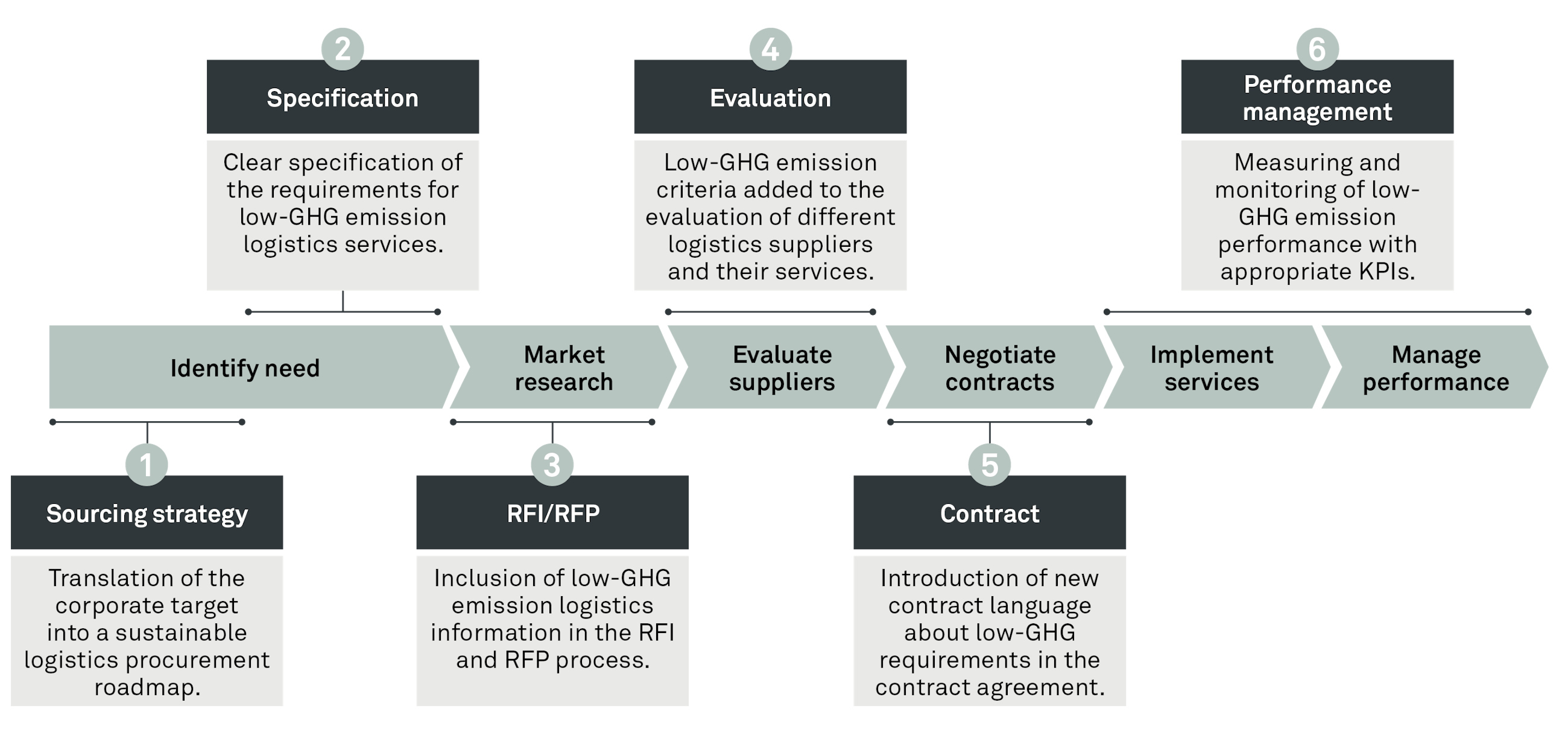11 April 2024
New procurement playbook with best practices, concrete guidelines and concepts for procuring sustainable logistics services
This article is co-authored by Julien Bictel and Rik Arends, Smart Freight Centre.
Implement Consulting Group and Smart Freight Centre (SFC), endorsed by the World Economic Forum (WEF) and Scope 3 Peer Group, have collaborated to produce the Procurement Playbook Toward Zero Emissions Logistics Services.
The playbook provides best practices, concrete guidelines and concepts that are readily accessible and applicable to procurement professionals looking to procure sustainable logistics services and can be adapted to industry or geographical needs.
The recommendations in the playbook have been designed based on real-life procurement use cases spanning all modes of transport through numerous workshops, use-case discussions and round-table sessions with participating members.
The aim of the playbook is to streamline and standardise the procurement of sustainable logistics services. The result is a common language and a set of guidelines and best practices firmly rooted in practical reality and applicable to a wide spectrum of logistics services.
Consequently, the playbook can be used to redesign the entire life cycle or a specific aspect of the procurement process to integrate sustainability into logistics.
Download the playbook
Benefit from the insights, best practices and practical advice of some of the largest multinational buyers of sustainable logistics services.
Download at Smart Freight Centre's websitePlaybook structure
On the journey to zero-emission logistics services, we will start by identifying two types of collaboration between shippers and logistics service providers (LSPs): transactional and transformational procurement. These archetypes will have a profound impact on your choice of sustainability strategy for procurement.
Next, we will take you through the various stages of standardising the procurement process through interventions along with the associated steps in getting you there. We will provide you with concrete recommendations based on the best practices identified among our members, ensuring that our guidelines are rooted in practical experiences.
Finally, we will outline how a transformational procurement process can be used and applied.
Types of collaboration between shippers and LSPs
Together with SFC, we have identified two archetypes of collaboration between a customer and its suppliers, defined by the type of shared goals and the methods used to achieve them. These archetypes – transactional and transformational – represent two distinct paradigms of business relationships, especially in the context of supply chain management and procurement.
- The transactional approach is suitable for situations where the goods or services being procured are standardised, readily available and easily interchangeable between suppliers.
- The transformational approach is more appropriate for procuring complex, innovative or critical goods or services, where long-term relationships, collaboration and value creation are paramount.
Determining which approach is most relevant to your business requires an evaluation of the intersection between strategic importance and market opportunities. To help navigate and provide a systematic approach to the evaluation of market opportunities, an example of the Logistics Industry Sustainable Maturity Matrix is available in annex 1 of the playbook.
Updating the transactional procurement process
Procurement is ideally positioned to tackle the current challenges associated with the decarbonisation of logistics services. Addressing these challenges requires overcoming various hurdles to successfully contract sustainable logistics services.
For the transactional approach, we recommend standardising the procurement process through six identified interventions consisting of (1) sourcing strategy, (2) specification, (3) RFI/RFP, (4) evaluation, (5) contract and (6) performance management.
A clear sourcing strategy empowers logistics professionals to optimise costs, improve service levels, mitigate risks, enhance visibility and control and foster collaboration and innovation with logistics service providers. Developing a sourcing strategy is a deeply involved process, and we have identified six milestones in getting there, from outlining the current strategy to scoping and selecting the most viable options.
We also provide a set of sustainable standards and methodologies in the specification of emissions reporting and performance requirements, providing you with a common language and a systematic approach to defining your sustainability requirements.
We take you through a five-step approach to the RFI and RFP process tailored to sustainability needs, ensuring that both the buyer and the service provider have a clear understanding of the scope, requirements and expectations.
The evaluation intervention outlines the two overarching strategies for comparing suppliers based on decarbonisation evaluation criteria and goes through the ten main criteria used to assess logistics service providers not yet considering sustainability.
In contracting, we aim to establish a binding relationship between buyer and seller that protects both parties. In doing so, we provide concrete examples of contract language, kindly provided by Poul Schmith, a law firm specialising in green transition.
Finally, we will take you through the implementation of robust performance and contract management, outlining a list of 15 considerations on what needs to change, from decarbonisation goals to KPIs and continuous improvement initiatives.
The playbook provides step-by-step roadmaps from outlining the current strategy to adapting to the new strategy, with guidelines for each intervention and concrete examples. In addition, the annexes include a maturity matrix, checklists and questionnaires.
Using a transformational approach
The transformational approach is an innovative and collaborative process between buyer and seller, and multiple factors should be considered when choosing this approach. We have identified five potential advantages, including customised solutions, improved supplier relationships and long-term competitive advantage, with benefits such as improved operational performance with a positive impact on cost savings and customer satisfaction.
In pursuing this approach, we have identified eight best practices, including attractive partner value propositions and partner operating models. In the playbook, we provide a framework containing transformational milestones, activities and deliverables to reach your sustainability goals.
In addition, since the transformational approach will most likely lead to substantial changes in supply chain operations and related processes, we will take you through the various considerations when opting for a partnership operating model. We provide you with a guide to help you on this journey and further improve the implementation and impact of your sustainability goals.
Conclusion
The procurement of sustainable logistics services requires a comprehensive approach that integrates sustainability across all steps of the procurement process. By implementing sustainable recommendations, fostering synergies and adhering to standards, organisations can establish the foundation for sustainable logistics procurement. Where solutions are not yet ready, transformational approaches can make reductions possible.
Ultimately, by embracing the strategies outlined in the playbook and acknowledging the dynamic nature of sustainable logistics, organisations can steer towards a future characterised by environmental responsibility and operational efficiency.
We hope that the recommendations will promote the integration of sustainability into the procurement process, thereby encouraging the development of net-zero logistics services.
Get the Playbook
Benefit from the insights, best practices and practical advice of some of the largest multinational buyers of sustainable logistics services.





